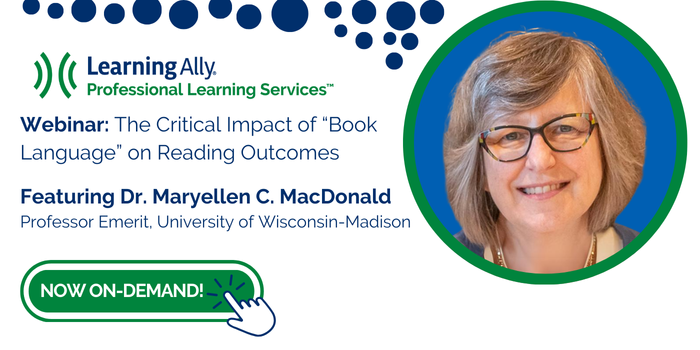The power of language is a vital tool, crucial not just for communication but for opening doors to a world of knowledge. This idea was the centerpiece of an enlightening webinar hosted by Learning Ally, featuring Dr. Maryellen MacDonald, a renowned language researcher and educator. During this webinar, Dr. MacDonald unpacked the intricacies of “book language” and its significance in boosting reading outcomes for children.

Understanding Book Language
Book language differs significantly from everyday speech and plays a crucial role in children’s literacy development. It’s a style inherent in written texts that requires children to learn new conventions and become adept readers. Unlike casual spoken language, book language is rich, multi-layered, and often challenging, requiring young readers to navigate complex vocabulary and intricate sentence structures.
The Difference Between Speech and Book Language
Speech to children is often simple due to shared knowledge and the immediacy of conversation, relying heavily on context and joint attention. In contrast, book language is crafted from a distance, demanding clarity in conveying information without such shared contexts. This discrepancy highlights the need for children to not only understand words but also grasp how they function within book language.
Dr. MacDonald emphasized that book language is found in more than just books. It permeates various media, including documentaries, audiobooks, and instructional texts. Each medium presents opportunities for children to encounter book language, aiding their understanding of narrative structure, complex sentence forms, and varied vocabulary.
The Role of Book Language in Literacy
Exposure to book language is essential for students’ cognitive and linguistic development. Here’s why:
- Rich Vocabulary Development:
Books often use more sophisticated vocabulary than everyday conversation. Exposure helps children learn new words, expand their vocabulary, and understand more complex language structures.
- Complex Sentence Structures:
Book language often includes longer, more complex sentences, which teach children how ideas are connected and help them develop the background knowledge critical to comprehension.
- Understanding Storytelling and Narrative:
Books introduce children to story structure—beginning, middle, and end—helping them understand how to organize thoughts and convey ideas.
- Foundation for Academic Success:
Familiarity with book language prepares children for the more formal, structured language used in schools and academic texts. Everyday language alone will not prepare students for the academic rigor that is required on state standards.
Strategies to Enhance Book Language Exposure
While traditional reading remains paramount in learning these language patterns, in our digital age, it’s essential to diversify the mediums through which children can access book language:
- Shared Book Reading:
This remains a cornerstone for introducing children to book language. It involves parents and teachers reading aloud to children, helping them engage with complex language constructs supported by visual content.
- Narrated Documentaries:
These provide a unique opportunity for exposure to book language. Documentaries typically use a narrator who explains detailed content, simulating a form of book language that children can understand with the help of visual cues.
- Audiobooks:
Contrary to the belief that audiobooks are a lesser form of reading, they offer significant exposure to book language. Listening to audiobooks can improve comprehension and introduce children to the cadence and complexity of written text through the spoken word.
Combining Strategies for Maximum Impact
Dr. MacDonald suggests a blended approach—integrating explicit instruction for vocabulary with natural book language experiences like reading and listening to audiobooks. This multifaceted exposure allows children to develop literacy skills organically, supported by the rich linguistic environment fostered by book language.
For readers with learning differences, human-narrated audiobooks provide an accessible way to experience the rich, complex language found in books—even when decoding is a challenge. Learn how our Audiobook Solution and Dyslexia Awareness Professional Learning can support educators and students in your district. Book a demo here.
In conclusion, while speech lays the foundation for verbal communication, mastering book language is critical for reading fluency. Educators and parents are urged to embrace diverse strategies, making book language a natural part of a child’s learning journey. This approach sharpens the mind and opens up worlds of adventure, knowledge, and growth.
Watch this illuminating webinar, now on-demand!
Frequently Asked Questions:
What is book language, and how does it differ from everyday speech?
Book language refers to the sophisticated language style found in written texts, characterized by richer vocabulary and complex sentence structures. Unlike everyday speech, which relies on shared context and simpler language, book language requires readers to engage with ideas more deeply and understand how words function in different contexts.
Why is exposure to book language important for children’s literacy development?
Exposure to book language is vital for enhancing children’s vocabulary and comprehension skills. It introduces them to complex sentence structures and narrative organization, laying a strong foundation for academic success and enabling them to navigate the more formal language used in schools.
What are some effective strategies to increase children’s exposure to book language?
Effective strategies include shared book reading, where adults read aloud to children, as well as watching narrated documentaries and listening to audiobooks. These activities provide children with rich linguistic experiences that help them grasp the complexities of book language in engaging ways.
How can audiobooks contribute to developing book language skills?
Audiobooks are a valuable resource for exposing children to book language, as they convey the rhythm and complexity of written text through narration. They also offer an accessible option for children with learning differences, allowing them to experience rich language without the challenges of decoding text.
How does book language prepare students for academic success?
Familiarity with book language equips students with the skills needed to tackle the structured and formal language found in academic texts. This preparation is essential for meeting state standards and handling the academic rigor required throughout their education.